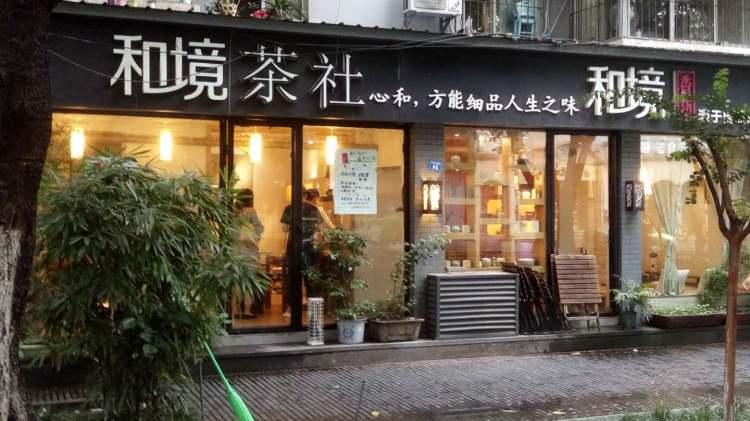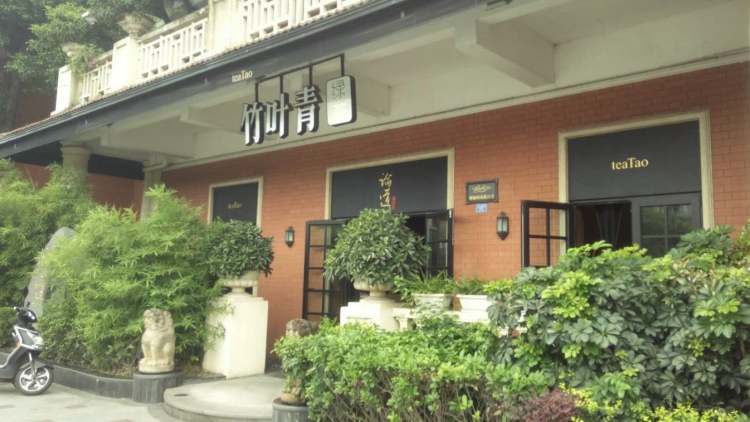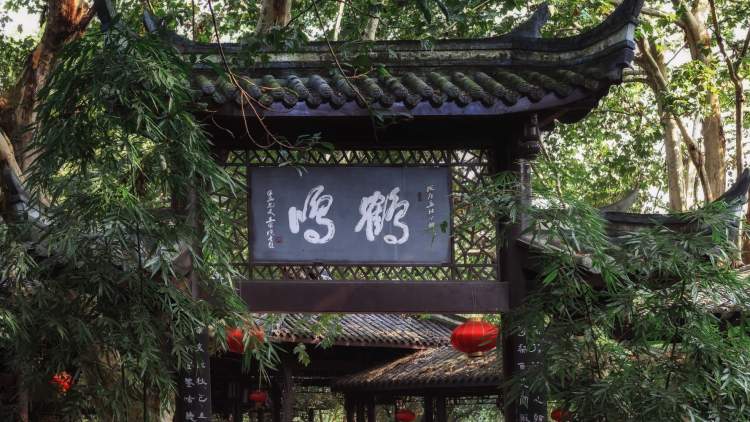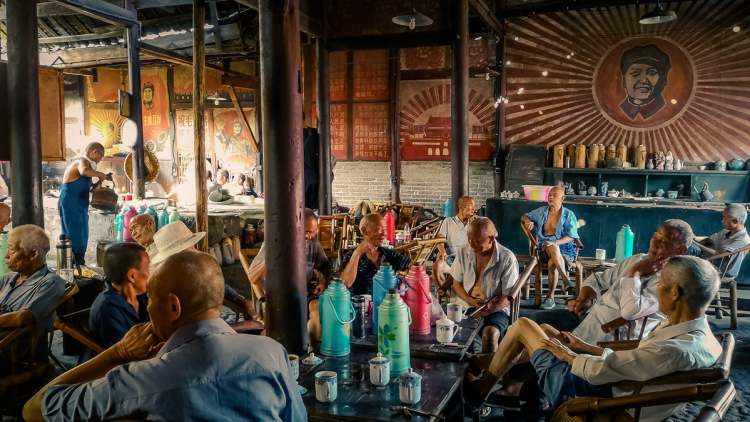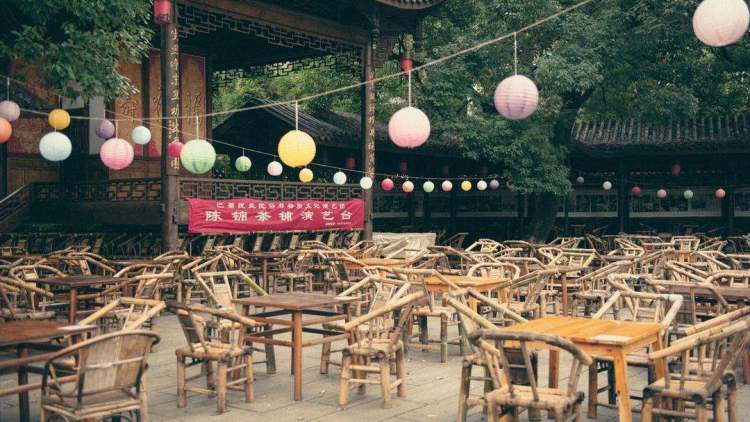Founded in 2011 and located near Kuanzhai Alley, Hejing Tea House is a boutique tea house known for its elegant style and high-quality tea. Chengdu's local open-air teahouses are lively and marketable, but they often ignore the quality of tea, and Hejing Tea House is a different style. The decoration of the tea house is exquisite, the quality of the tea is satisfactory, and the price is close to the people, which attracts many tea customers.
Hejing Tea House offers seven types of tea: white tea, black tea, black tea, oolong tea, Pu'er tea, flower tea, and green tea, the first five are used for kung fu tea, and the last two are gaiwan tea. There are fewer varieties of white tea and black tea, which are Shou Mei and Ya'an Tibetan tea, respectively. Most of the Pu'er stores were produced in 2002 and 2003, and there are categories of ancient tree Pu'er and Chinese tea yellow seals. Oolong tea is mainly from Taiwan and Fujian, and the varieties are relatively rich, such as Tieguanyin, Narcissus, Single Longitudinal, Narcissus, and Wuye Snow Flakes. Among them, Oriental Beauty is a unique famous tea in Taiwan, the tea soup is yellow and clear, the taste is mellow and sweet, and it is the best tea in oolong tea. Black tea covers the mainstream tea varieties in the market, including Zhengshan small seed, alpine black tea, Keemun black tea and ancient tree Yunnan red.
Hejing Tea House provides Gaiwan tea with Chengdu characteristics, including Mengding nectar, Mengding yellow bud, bamboo leaf green and Bitan Piaoxue, as well as mulberry fruit tea and rose tea, which are popular with young people. It is worth mentioning that in terms of green tea, Hejing does not directly purchase finished tea, but cooperates with tea gardens to personally control the picking and frying links. The two tea plantations are 1,500 meters and 2,100 meters above sea level, respectively, with a remote environment, low pollution levels, and professional roasters, resulting in excellent and stable tea quality. Under the premise of attaching importance to the quality control chain, it is difficult to mass-produce green tea in the store, and its quality is relatively scarce in the market, which is definitely a good product not to be missed. In addition, the Hejing Tea Society gives corresponding cakes according to the tea, and pays attention to the combination of tea and dim sum.
The famous tea Zhu Yeqing has become popular in the circle, which is not unrelated to the trademark registration and the commercial promotion of the parent company. In terms of prestige, the Mengding manna recommended by the Hejing Tea Society may not be as good as Zhuyeqing, but it is also the top green tea in Sichuan, and many tea lovers believe that Mengding manna is the oldest Sichuan tea, and some people even trace the time back to the Han Dynasty. It is not necessary to trace the history, the quality of the Mengding manna in the company is excellent, its tea type is curly and slender, compact and multi-silver, the tea soup is like nectar, the blue is clear and slightly yellow, the taste is mellow and sweet, when it is brewed twice, it is more and more fresh and mellow, this phenomenon is sometimes called "tooth and cheek fragrance". Due to the opening of tea mountains and the increase in demand for tea, many tea trees in Sichuan tea plantations were transplanted from Fujian, and the Mengding manna produced is thicker than the tea produced by local tea trees, and the fragrance is much weaker after three or four brews. Hejing Tea House cooperates with top tea plantations, its tree species are pure, and planted in the mountains at an altitude of 1,200 meters, the Mengding manna tea produced is very slender, and the aroma is still strong after repeated brewing, and the flavor is obviously better than that of Mengding manna with "Fujian blood".
In terms of tea ware, Hejing chose the original tea set from the domestic studio and the Taiwanese tea set, which is more common and has no special features. The water used in Hejing is "Tianfu Shuirun" bottled water, which is much better than the low-end teahouses that use tap water. Hejing has sold tea and tea sets, the price ranges from tens of yuan to thousands of yuan, but the tea master does not take the initiative to recommend, if there is a tea customer who asks about tea, the tea master will briefly introduce, brew to taste, and there is no excessive promotion, the consumer experience is good. The majority of the customers are regular customers, and some tea customers have their own tea cups, sometimes even stored directly in the store, which is relatively rare in Chengdu tea houses.
Hejing Tea House adopts classical decoration style, with green as the keynote, mainly using log furniture, simple and elegant, quite a bit of Japanese style charm. The small store is divided into private rooms and halls, and the private rooms are tatami mats, and the tea rooms in the hall are separated by curtains, creating a private space, but the sound of conversation still interferes with each other from time to time. However, compared to the open-air tea houses with dozens of tables at every turn, the Hejing Tea House is quite quiet. Hejing is close to the street, and the store is designed with floor-to-ceiling windows, and the café next to the window has less privacy.
Hejing Tea House provides two ways to drink tea, gongfu tea and gaiwan tea, kung fu tea can be brewed by itself, or operated by a tea master, there is no additional tea art fee, and there is no tea art performance. The menu is very unique, and the staff writes the name of the tea on the bamboo slips for customers to choose from. Gaiwan tea is 30 yuan to 35 yuan for a cup, kung fu tea is 20 yuan per person, and the price of tea is calculated separately, ranging from 58 yuan to 158 yuan. Hejing Tea House charges a mid-range fee, which is more cost-effective than its elegant environment and high-quality tea.



